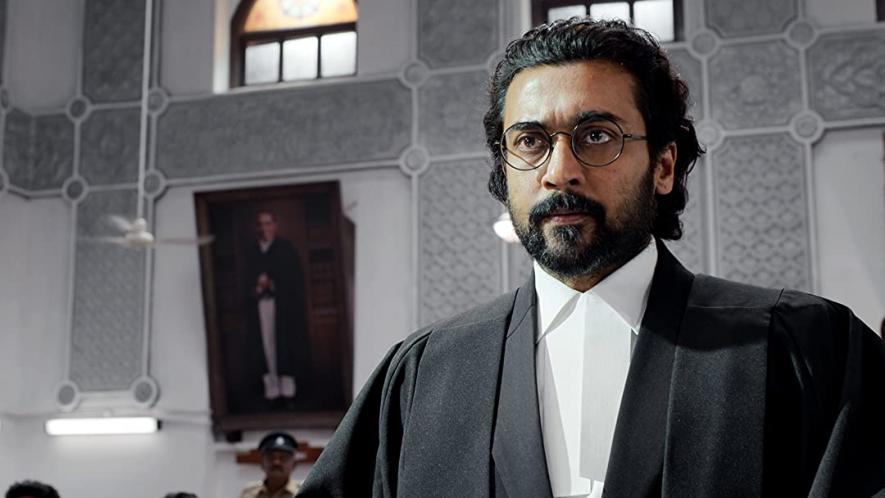Jai Bhim: A Poem Sung Loudly Against the Darkness of Our Time

Iranian film director Abbas Kiarostami once said, “I have often noticed that we are not able to look at what we have in front of us, unless it’s inside a frame.” Kiarostami, known for his films with child protagonists who exhibit individualism in the most poetic ways possible, notably perceived and subsequently handled the movie’s frame as a window. Through this window, people could emerge and finally see the reality right next to them, which they were conveniently ignorant of so far. Of any art form that existed on earth, Jai Bhim is the most political ever. It is because people not only experience the movie with their eyes and ears but also with the body, the blood flowing within them, even the veins under their skin. The journey of films in India began with mythological stories that converted illogical and unscientific myths into what is now commonly perceived as social history. In the following decades, films in India romanticised the aspect of violence. With the exception of a few movies, films in India have failed to accommodate the reality and truth of violence in their frames. No movie in India ever dared to put the element of justice at the centre of its story. Jai Bhim, a Tamil movie starring Suriya and directed by T.J. Gnanavel, must be considered a breakthrough. This is because when we of the caste republic—who despise the very existence of the caste below us and admire those of the caste above us—dispassionately watch Jai Bhim, it transports us into the world around us that we neglected in the pursuit of illusions created by Bollywood and other popular cinema.
Jai Bhim is a biopic based on the life of former Madras High Court Judge, Justice K. Chandru. It has been over a month since the movie was released. Now, people know its story. The film has got as much praise as it criticism, and the reasons for either have been hotly discussed and debated. In what way should marginalised people be portrayed in films? Why did not the lawyer in the film belong to the same community as the victims? Why is it titled Jai Bhim when Communist groups are shown in it? These were the endless questions raised while criticising the film.
On the other hand, Jai Bhim has got praise for its story and the performances of its actors. Aside from the praise and critiques, Jai Bhim is a fantastic movie because it convinces us we all are part of whatever is happening in its story. As a society, it shows us the truth behind the violence we witness around us, which we often ignore and feel unrelated to. Jai Bhim convinces us that in caste society, violence is a collective construction. Hence, all of us have a responsibility to seek justice and fight for it. No society can survive by discarding some of its citizens. Jai Bhim involves us as an audience in its frames and helps us realise this fact.
Depictions of violence against the Irula tribal community from Tamil Nadu is spread across the film. However, as a movie must, Jai Bhim expands its vision from violence to justice. It is remarkable because the protagonist is not a person but an idea: the idea of justice. Jai Bhim is a story of us as a society waking up to the real among us, and it happens through the frames of a film.
From the moment I began to watch Jai Bhim, I felt depressed as violence kept popping up on the screen. Violence is something I saw while growing up, so it was not all new to me. Witnessing the same violence in films is something people like me avoid as we want to escape from it, and also because we know we hardly get any justice. I am the cultural minority in this country, and hence my truths are not real for caste society. Tribal communities are outside the public imagination of caste society. [What about their truths?] But great films, by virtue of their existence, communicate with us irrespective of their subject or story.
Jai Bhim communicates with us because it speaks the language of justice, which we have forgotten to speak a long time ago. The canvas of the film is dark: there is no romance in it, no glorification of anything, no attempt to please the senses of audiences, and certainly, there is no effort to impress anyone or amaze people. It is a story that speaks to what is unconscious within us: the sense of brutality that we all inherit in caste society, in the form of our silence against oppression. Even the greatest films in the world do not change anything substantially in our lives. But great films are great because they speak to us in a language no one else could; they say what no one else has dared to speak to us about. It is the language of the poetry of life in its most naked form. In total darkness, poetry is still there, and it is there for you, says Abbas Kiarostami. Jai Bhim is poetry in frames sung loudly in the darkness of our time.
Yogesh Maitreya is a poet, translator and founder of Panther’s Paw Publication, an anti-caste publishing house. He is pursuing a PhD at the Tata Institute of Social Sciences, Mumbai.
Disclaimer: The views expressed in this article are the writer's own, and do not necessarily represent the views of the Indian Writers' Forum.
Get the latest reports & analysis with people's perspective on Protests, movements & deep analytical videos, discussions of the current affairs in your Telegram app. Subscribe to NewsClick's Telegram channel & get Real-Time updates on stories, as they get published on our website.
























